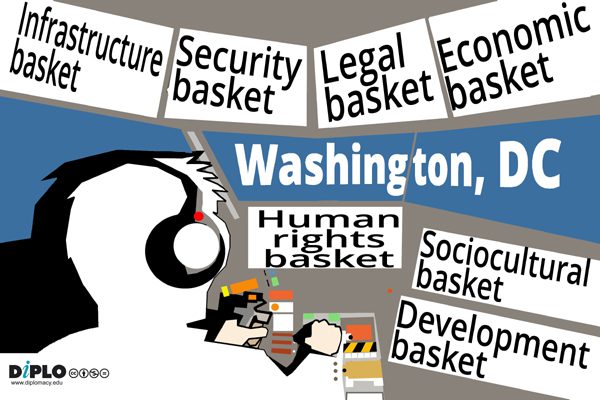
DiploNews – Issue 364 – 4 February 2019
Upcoming study opportunities
Introduction to Digital Policy and Diplomacy – Washington, DC
This course will assist professionals in Washington, DC to actively follow the increasingly relevant fields of digital policy and Internet governance. The course will benefit individuals directly working or engaging with Internet-related policy fields (e.g. telecommunications, human rights, cybersecurity, trade, development). In addition to building their knowledge of digital politics, course participants will gain in-demand practical skills for staying abreast of digital policy processes ranging from global Internet governance architecture to privacy and data protection to cybersecurity. All course content is tailored to the DC policy environment. The course is organised by Diplo US in co-operation with New America. Due to the blended learning course format which includes weekly face-to-face meetings, registration for this course is open only to applicants available to meet weekly in Washington, DC. The course starts 19 February 2019 and the application deadline is 10 February 2019. Please visit the course webpage to read more and apply.

Capacity Development – last chance to apply
Capacity development has been emerging as a central approach within development for more than two decades. To help development professionals better understand and master this paradigm, this interactive online course introduces the key concepts, principles, and values of capacity development. The main focus is on building practical skills for better design, planning, implementation, and assessment of capacity development initiatives. The next session starts 18 February 2019 and the application deadline is 5 February 2019. Please visit the course webpage to read more and apply.
February 2019 online diplomacy courses – last chance to apply
Start the new year with one of our most popular online courses:
Apply by 5 February 2019 for Diplo certificate courses. For further information or to apply, click on the titles of the courses listed, or visit our courses webpage. Register now to reserve your place.
May 2019 online diplomacy courses
Starting on 6 May 2019, we offer courses on diplomacy topics, both classic and contemporary:
Apply by 4 March 2019 for University of Malta accredited courses and by 1 April for Diplo certificate courses. For further information or to apply, click on the titles of the courses listed, or visit our courses webpage. Register now to reserve your place.
Malta scholarships
Thanks to support from the government of Malta, partial scholarships are available for applicants from developing countries to attend upcoming Diplo online courses. These scholarships cover 30%–60% of course fees and can be applied to most online courses in 2019. Browse our course catalogue and contact us at admissions@diplomacy.edu for further information. You can also sign up for our courses mailing list to be informed about upcoming courses.
Report on mapping AI’s challenges and opportunities for the conduct of diplomacy

[WebDebate] Arctic diplomacy: Approaches and lessons
Join us for our upcoming [WebDebate] Arctic diplomacy: Approaches and lessons on Tuesday, 5th February 2019, at 12:00 UTC / 13:00 CET.
The Arctic is a place and object of diplomacy. It is particularly interesting to use it as a lens through which to explore various diplomatic approaches and practices. The experts in this debate all focus on the Arctic but cover different topics and therefore give us different angles on the topic. For the discussion, we are joined by Prof. Paul Arthur Berkman (Professor of Practice in Science Diplomacy, Fletcher School, Tufts University), Dr Danita Catherine Burke (Marie Skłodowska-Curie Individual Fellow at the Center for War Studies at University of Southern Denmark), and Dr André Saramago (Assistant Professor of International Relations, Faculty of Human and Social Sciences University Beira Interior and School of Economics, Coimbra University).
[Event summary] The impact of AI on diplomacy and international relations
The impact of AI on diplomacy and international relations, organised by the Center for Data Innovation and DiploFoundation, brought together over 150 people – diplomats, policymakers from EU institutions and member states, researchers, journalists, and others – with an interest in the relationship between AI, diplomacy, and foreign policy. The event served as a platform to launch and discuss DiploFoundation’s report on Mapping the challenges and opportunities of artificial intelligence for the conduct of diplomacy, which was commissioned by the Finnish Ministry for Foreign Affairs. The launch was followed by three panels of experts, which deepened the discussion on some of the key themes and allowed for a further exchange of ideas. Read the full summary.
What’s been happening in Diplo’s blogosphere
In Digital literacy for digital natives, Natasa Perucica and Katarina Andjelkovic discuss their policy brief Digital literacy for digital natives: The role of educators in shaping competent and responsible digital citizens. Inspired by the 10-year challenge on social media, in On the gaydar: A 100-year challenge for facial recognition, Darija Medic explores AI used for facial recognition, and in particular, looks at a study in which AI was used to determine sexuality. The United Nations Institute for Disarmament Research (UNIDIR) together with the Center for Strategic and International Studies (CSIS) held a workshop on The Role of Regional Organizations in Strengthening Cybersecurity and Stability. Read Natasa Perucica’s summary of the event. In her blog post Digital identities: Issues and cases, Grace Mutungu discusses the rise of digital identification systems in low- and middle-income countries, and the various issues surrounding digital identities.


